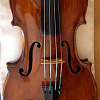We have thousands of human-written stories, discussions, interviews and reviews from today through the past 20+ years. Find them here:

April 2014
V.com weekend vote: The last time you gave a standing ovation, why did you?
April 25, 2014 11:18Have you ever been in one of those situations where everyone around you is giving a standing ovation for a performance that you just did not feel was worth a standing ovation?
And what did you do, did you stand, or did you sit there in conspicuous disapproval?
It's a real conundrum, in a day when people will stand and applaud for nearly anything. And sometimes, it's not a matter of disliking the performance as it is a feeling that the performance did not rise to some kind of exceptional height that would require exceptional applause. Because a standing ovation is supposed to be for something that isn't just good, but it's exceptionally good. Isn't it?
And then of course, there are the times when the performance really IS exceptional.

So the last time you participated in a standing ovation, was it because you truly felt the performance was worthy, or was it because everyone else was standing and so you stood, too? Be honest, now!
Tweet
V.com weekend vote: Have you studied the Paganini Caprices? How many have you studied?
April 18, 2014 10:54After posting the interview with Ilya Gringolts about the Paganini Caprices this week, I received an e-mail from a longtime V.commie:
I had a typo. Plus some personal advice, "Start practicing the caprices. Just do it."
 Sounds like a Nike commercial, sheesh! And anyway, I thought Ilya was letting me off the hook with the whole idea that I probably won't get anywhere anyway with these Caprices anyway. When I had resolved to learn them some years back, I was advised to start with a challenging one, how about No. 4? I worked and worked, but man that was a tall mountain. Are they all like this? My struggle with No. 4 might have reinforced my feeling that the caprices were simply insurmountable and just not worth, well, the heartbreak.
Sounds like a Nike commercial, sheesh! And anyway, I thought Ilya was letting me off the hook with the whole idea that I probably won't get anywhere anyway with these Caprices anyway. When I had resolved to learn them some years back, I was advised to start with a challenging one, how about No. 4? I worked and worked, but man that was a tall mountain. Are they all like this? My struggle with No. 4 might have reinforced my feeling that the caprices were simply insurmountable and just not worth, well, the heartbreak.
My friend assured me they are not all quite as bad as No. 4, and working on them is indeed worth it. "Since working through these monsters, my chops feel so great. Everything feels easier. Everything," she said. "It is steamed broccoli for your chops."
Hmmm. Streamed broccoli? My chops probably could use some roughage.
So which one should I start (over) with? And also, have you studied the Caprices? And how many of them have you studied? (The numbers in the poll refer to how many caprices you've studied, not to the number of the actual caprice).
Tweet
V.com weekend vote: How are your math skills?
April 11, 2014 14:27While music and violin-playing certainly draw on our imagination and artistic sensibilities, they also require a lot of mathematical thinking.
In fact, I've heard a number of people state that musicians tend to be good at math. But is that true? And if so, does the study of music improve one's math skills, or are mathematically-minded people simply more drawn to music?

How is it for you, are you better-than-average at math, average, or is math just not your subject? And what is your opinion on the matter?
Tweet
V.com weekend vote: Do you have long fingers, medium or short?
April 4, 2014 14:14There were a number of jealous responses to this picture of Menuhin Competition winner Stephen Waarts:

"Look at those long fingers!"
It's true, certain things (like 10ths, possibly creating variety in vibrato) are likely easier, with longer fingers. But finger length does not matter as much on violin as it does, say, on the piano, where, if you can't reach an interval, you can't reach an interval. At least we have various-sized violins. Those with very small hands can use a 3/4 or a 7/8 violin if needed, and of course children can learn on fractional instruments.
How about you, are your fingers long, medium or small?
Tweet
More entries: March 2014











